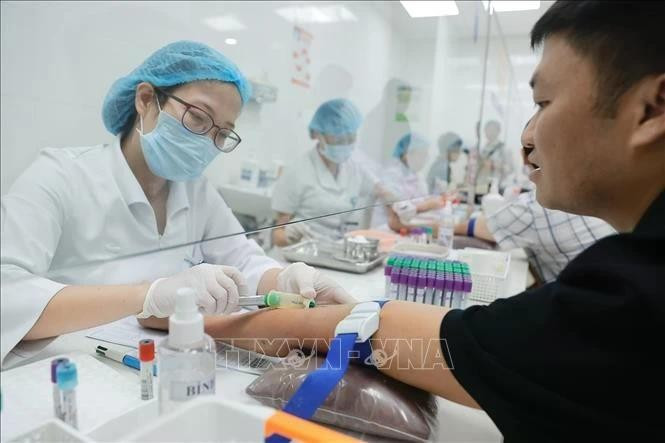
In 2024, Vietnam's healthcare sector continued to prioritize a patient-centered approach, aiming to enhance the quality of medical services, while also driving institutional and administrative reforms.
Dr. Nguyen Trong Khoa, Deputy Director of the Department of Medical Examination and Treatment under the Ministry of Health, said that 2024 marked the first year of the implementation of the Law on Medical Examination and Treatment 2023, along with Government Decree No. 96/2023/ND-CP formalising regulations of the law, the ministry’s Circular No. 32/2023/TT-BYT instructing the implementation of the law and other guiding documents.
Vietnam currently boasts 1,645 hospitals, including 384 private facilities, and has recorded over 170 million outpatient visits and more than 17 million inpatient treatments.
The national healthcare network has also seen significant growth, with expanded satellite hospitals and telemedicine services reaching more patients across the country, he noted.
The healthcare system made remarkable strides in adopting advanced medical techniques, particularly in organ transplants and fetal heart interventions.
Public awareness campaigns have led to notable increases in blood and organ donations, contributing to more successful transplants compared to 2023.
In addition, the department released a new list of technical services and economic-technical characteristics related to medical examination and treatment.
This provides a clear framework for establishing service fees.
Timely adjustments to these fees have enabled healthcare facilities to secure the financial resources necessary for salary increases in line with the new base wage, as well as reinvest in equipment and medical technology, resulting in overall improvements in service quality.
The evaluation and licensing process for hospital operations also improved. Specific criteria for organising assessment documentation and implementing ISO standards for evaluations were established, along with a monthly assessment plan.
By December 20, the department had assessed 101 out of 126 applications, reaching 80% of the annual target. The streamlined assessment process has received strong support from hospitals, helping to reduce waiting times and prevent resource wastage, Khoa said.
Strengthening institutional frameworks
In 2024, Khoa said the department focused its resources on completing the legal framework for medical examination and treatment.
Six major policy areas were addressed, including developing the list of technical and economic characteristics for healthcare service fees, eliminating outdated hospital regulations, establishing basic quality standards for hospitals, classifying healthcare facilities, promoting digital transformation, and refining professional and technical policies.
As of December 20, the department had submitted to the ministry six out of nine circulars and one project, with two circulars approved for inclusion in the ministry's 2025 work programme.
A significant achievement in 2024 was the full digitalization of administrative procedures for medical licensing and certification. Medical professionals no longer need to submit paperwork in person, as the process can now be completed online through the national licensing management system.
All fees are now paid electronically, reducing administrative burdens on both healthcare providers and practitioners.
The department also developed 30 new administrative procedures, which are currently being finalised for approval. It successfully addressed all 17 feedback submissions on the National Public Service Portal and received 5,071 applications - a 75% increase compared to the same period in 2023, and resolved 4,248 of them or 84%.
Higher quality standards needed
According to Dr. Ha Anh Duc, Director of the department, in 2025, the department will continue refining the legal framework and focusing on solutions to address hospital overcrowding.
Efforts to link quality assessments with healthcare service fees and insurance reimbursements will be prioritized. Additionally, strengthening inspections and monitoring of healthcare facilities will be crucial to maintaining high standards.
Deputy Minister of Health Tran Van Thuan praised the department's achievements in 2024 and emphasised the need for higher quality standards to ensure transparency in hospital quality.
Additionally, while progress has been made in processing licences for private hospitals, there are still pending applications that need prompt resolution.
The department must complete the classification of medical facilities by January 1, 2025, in alignment with the new Medical Examination and Treatment Law.
Three draft circulars are currently being expedited for finalisation.Promoting digital transformation and expanding private hospital bed capacity will also be focused in the upcoming year./.























